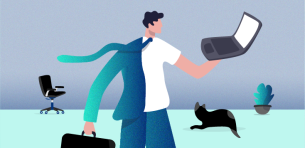
Car Next Door founder Will Davies. Source: supplied.
When Car Next Door appeared at number five on the 2018 Smart50 list, co-founder Will Davies saw the business as a solution to the ‘sticky problem’ of car over-population and over-use.
Needless to say, he didn’t foresee that one day, it would be also solving hire car shortages and helping tourism industries get back on their feet in the wake of a global pandemic.
Car Next Door’s experience serves as a useful reminder for businesses owners and founders to always test your assumptions.
The rental squeeze
When the pandemic first began, Davies says like many others, the team had very little idea about what to expect. Having built a business and culture where assumptions are challenged, Car Next Door was in the position to seize unexpected opportunities when they arose.
“I didn’t predict the rental car squeeze. I didn’t predict that car prices would go sky high. I was speaking with a CEO of a major car dealership, and we concluded that it was going to send the price of cars down,” Davies says.
“In the end, the exact opposite happened. It goes to show just how wrong your assumptions can be.”
This hire car shortage, combined with the spike in car prices, meant that when restrictions began to ease, a number of states were worried about how this might negatively impact tourism sectors already reeling from the pandemic.
In fact, the Tasmanian government actually turned to Car Next Door to provide the business with incentives to launch in the state in order to plug the gap. Part of the reason Car Next Door was in a position to launch quickly in Tasmania was because of a decision made back in 2018.
At the time, to share your vehicle with Car Next Door, you needed to install a special piece of equipment on it. The assumption Davies and his team had made up until that point was that Car Next Door needed to install that equipment for owners. But the team decided to run a test. What if they were to post these pieces of equipment to car owners, and allow them to install it themselves?
“We were thinking it was probably going to reduce conversions, but not by too much. But it actually converted better than us doing it,” Davies says.
“It’s a good reminder that you need to be constantly testing your assumptions,” he says, saying this was “a massive, wrong assumption” to have made.
“[Now it] means we can have these kits all around the place, and put them on for much cheaper as well.”
While testing your assumptions is essential, Davies acknowledges the most difficult part can often be choosing which assumptions to prioritise testing.
“That’s where it gets hard. There is only a certain amount of things you can test,” he says.
Thanks to the decision to let owners install their own equipment, and the launch of a key handover model in 2019 which allows owners to share their cars with no equipment at all, Car Next Door was able to quickly launch in Tasmania, the Northern Territory and South Australia.
What’s the new normal?
As Australia emerges from the latest round of public health restrictions, Car Next Door is taking a fresh look at the needs of its customers. During the pandemic, it cut right back on aggressive marketing.
“We wanted to make sure if someone was looking for a service like ours, they could find us. But we were keeping our powder dry for when the world moves back to normalcy,” Davies says.
Now, Car Next Door is embarking on its first big piece of market research, examining the needs of its customers. The business wants to understand what is the new normal.
Transport is one of the industries where the answer to that question might change the most over the next 10 to 15 years. Davies expects to see an enormous amount of disruption.
His advice to founders operating in fluctuating industries is to surround yourself with the right team.
“Everyone says this, but it’s so important to have the right people in the right positions at the top of your organisation,” he says.
“Having a super effective person, compared to the average, makes a huge difference.”
But what exactly does the future hold for transport?
“There is a clear trend towards people sharing more, and there’s going to be autonomous cars. I don’t know if it’s in two years, or 15 years, but it’s coming,” Davies says.
“Once you’ve got autonomous cars in the system, it makes the whole thing cheaper and more efficient. The world we’re in at the moment is everyone buys a car and it sits around doing nothing 90% of the time.
“(The future) is going to be a hell of a lot more efficient. I’m super keen for humankind to make that transition and also for Car Next Door to play a part in that.”



COMMENTS
SmartCompany is committed to hosting lively discussions. Help us keep the conversation useful, interesting and welcoming. We aim to publish comments quickly in the interest of promoting robust conversation, but we’re a small team and we deploy filters to protect against legal risk. Occasionally your comment may be held up while it is being reviewed, but we’re working as fast as we can to keep the conversation rolling.
The SmartCompany comment section is members-only content. Please subscribe to leave a comment.
The SmartCompany comment section is members-only content. Please login to leave a comment.